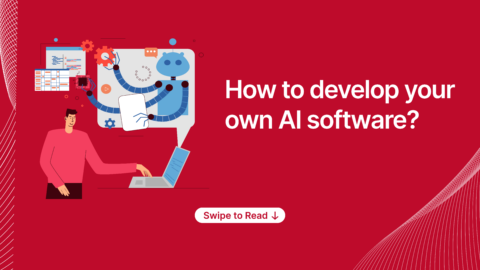In today’s digital age, it’s nearly impossible to encounter someone without a smartphone. Reports indicate that approximately 7 billion people worldwide are utilizing smart devices. This surge in smartphone users has led to a rapid expansion of the mobile application development industry, resulting in a significant increase in the number of mobile apps being released on both the Google Play Store and Apple App Store on daily basis.
Did you know? An average of 2,233 new apps are released on Google Play per day.
While numerous apps are launched daily, not all of them achieve popularity among smartphone users. Certain apps stand out due to specific factors like positive ratings and reviews, user-friendly interfaces, and notably effective user engagement strategies.
Conversely, the early stages of mobile app development were relatively straightforward, requiring only modest processing power and mobile device capabilities. During that period, the range of mobile apps was quite limited, with mobile phones primarily featuring basic applications such as calculators, clocks, calendars, and messaging tools. However, as time passed, the mobile phone development industry underwent rapid and dramatic growth, driven by the emergence of smartphones, and it continues to expand without interruption.
The emergence of Artificial Intelligence:
Artificial intelligence has undoubtedly emerged as a focal point in the contemporary world, with its influence permeating virtually every facet of life, showing remarkable growth day by day. According to a report by Forbes, the global artificial intelligence market is poised for substantial expansion, with a projected compound annual growth rate (CAGR) of 37.3% from 2023 to 2030. It is projected to reach $1,811.8 billion by 2030.
It’s not surprising that artificial intelligence has made significant inroads into the mobile development industry as well. This technological revolution has left an indelible mark on this sector, transforming the way mobile applications are designed, developed, and utilized.
Challenges faced by mobile app developers before AI’s intervention:
Personalization Constraints: Apps struggled to provide customized experiences tailored to individual user preferences and actions.
Manual Data Handling: Mobile apps depend on manual data input and processing, resulting in inefficiencies and the potential for errors.
User Engagement Issues: Developers found it challenging to maintain user engagement and sustain interest over time.
Complex Coding Demands: The development of intricate features and functionalities required extensive coding and development efforts.
Performance Optimization: Ensuring smooth app performance across various devices with differing specifications posed difficulties.
Predictive Capabilities Gap: Predicting user needs and behaviors proved challenging without the assistance of AI-driven predictive analytics.
Manual Support and Maintenance: The upkeep and support of apps necessitated manual monitoring and updates.
Automation Limitations: Automation within mobile apps was limited, resulting in repetitive tasks for users.
Resource Constraints: Developers frequently encountered limitations in computing power and data storage resources.
Scaling Challenges: Expanding apps to accommodate a growing user base was a complex and resource-intensive undertaking.
AI’s revolution in mobile app development:
There’s no denying that Artificial Intelligence has emerged as a significant blessing for the mobile app development industry, propelling the development process to unprecedented levels of efficiency, productivity, and innovation. Here are some benefits that artificial intelligence (AI) has brought to the mobile app development community.
Improved User Experience: AI-powered mobile apps can analyze how users interact with them and understand their preferences. This allows the apps to offer personalized content and suggestions, making the user experience more enjoyable and increasing user satisfaction and loyalty.
Voice and Speech Recognition: AI-driven technologies like Siri, Google Assistant, and Alexa have transformed how people use mobile devices. Developers can incorporate voice recognition into their apps, enabling users to perform actions using voice commands, which makes the apps more accessible and user-friendly.
Natural Language Processing (NLP): NLP algorithms empower mobile apps to understand and interpret human language effectively. This is especially valuable for chatbots, virtual assistants, and translation apps, as it enables users to interact with these apps in a more natural and conversational manner.
Predictive Analytics: AI can analyze vast amounts of data to make predictions and recommendations. In mobile app development, predictive analytics can suggest products, content, or actions based on users’ past behavior, enhancing user engagement and conversion rates.
Enhanced Security: AI-driven security features, such as facial recognition and fingerprint scanning, bolster the security of mobile apps. AI algorithms can identify and prevent fraudulent activities, detect unusual login patterns, and safeguard sensitive user information.
Automated Testing and Debugging: AI-based tools can automate the often time-consuming processes of testing and debugging, leading to quicker development cycles and higher app quality and reliability.
Personalized App Experiences: AI algorithms analyze user data to tailor app experiences. For instance, e-commerce apps can recommend products based on previous purchases, while news apps can deliver content that matches individual interests.
Efficient Development: AI-powered tools and frameworks simplify app development by handling repetitive tasks. Developers can utilize AI to generate code, optimize app performance, and even create user interface designs, saving both time and effort.
Data Insights: AI-driven analytics tools provide developers with valuable insights into user behavior and app performance. This data aids in making informed decisions about updates and enhancements to the app.
Cost Reduction: By automating various aspects of app development, AI helps lower development costs. It also identifies areas where resources can be allocated more effectively, contributing to cost savings.
These advantages demonstrate how AI has significantly enhanced the mobile app development process and user experience. Developers can harness AI’s capabilities to create more engaging, efficient, and secure mobile apps.
Some fascinating facts about AI’s impact on mobile app development
- By 2030, the global AI market is projected to reach an astounding $2 trillion, showcasing its rapid growth despite its relatively recent adoption.
- According to Gartner, Inc., by 2027, chatbots will replace live agents as the primary method of customer care for almost a quarter of businesses.
- 68% of users enjoy the speed at which chatbots answer, according to UserLike
- 40% of people use the voice search function at least once every day
- 40% of businesses say that customer experience is their top motivator for using artificial intelligence.
Final thoughts
In summary, it is evident that integrating AI into mobile app development offers significant advantages to the industry. Users are increasingly drawn to engaging and interactive mobile apps, and incorporating AI features such as voice search and chatbots, while ensuring robust data security, is poised to drive substantial growth in the development of mobile apps in the current era. However, it’s undeniable that AI is still evolving, with ongoing challenges related to scalability and code quality. Nevertheless, there is no doubt that AI will undergo significant improvements in the near future, and this trajectory will result in remarkable advancements in mobile app development.
After reading this blog post, you should have a clear understanding of the benefits of incorporating AI technologies into modern mobile apps. Are you considering upgrading your outdated mobile apps with AI capabilities or searching for the ideal resource to create AI-enhanced mobile apps? You’ve come to the right place! Agira Technologies is here to support. Our talented tech experts possess extensive knowledge and skills in enhancing and developing mobile apps with the latest AI features. We are your go-to solution for turning your dream mobile app into reality through our technological expertise. If you’d like to learn more about our tech services, simply say “Hi.”










